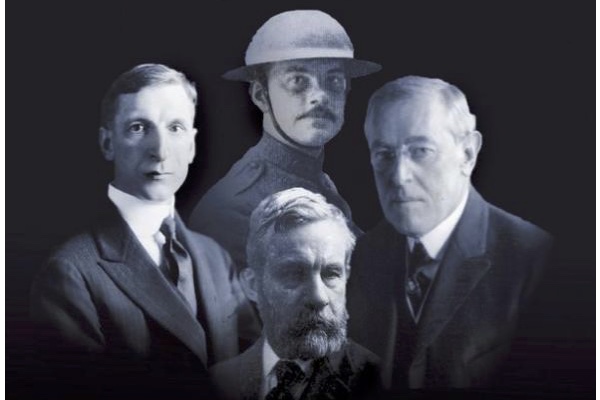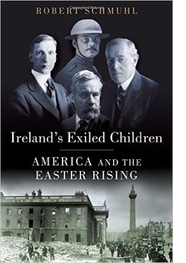Does Woodrow Wilson Have an Irish Problem, too?

The more that becomes known of Woodrow Wilson, the less admirable he seems as a political figure and human being. Recent demonstrations by college students raised serious questions about his racial prejudice directed at African Americans.
 Although
he tried to disguise another bias, an examination of his papers
reveals an almost total lack of concern for the Irish Question that
demanded an answer during his presidency. With World War I raging,
nationalist calls in Ireland grew louder as Great Britain tried to
hold together what was then known as the “United Kingdom of Great
Britain and Ireland.” Could a U.S. president help solve the
decades-old problem?
Although
he tried to disguise another bias, an examination of his papers
reveals an almost total lack of concern for the Irish Question that
demanded an answer during his presidency. With World War I raging,
nationalist calls in Ireland grew louder as Great Britain tried to
hold together what was then known as the “United Kingdom of Great
Britain and Ireland.” Could a U.S. president help solve the
decades-old problem?
As a candidate and as U.S. president, Wilson was politically cunning in approaching the American Irish. He realized that offending a loyal constituency of the Democratic Party could cost him votes—and power.
In front of big-city audiences campaigning for president, Wilson proudly pointed to his ancestry—two paternal grandparents came from County Tyrone—to appeal to Irish Americans. For instance, less than a month before he won his first White House term in 1912, he spoke at a campaign rally at the armory of “the Fighting Irish Seventh Regiment” in Chicago.
“I have in me a very interesting and troublesome mixture of bloods,” he declared. “I get all my stubbornness from the Scotch [on his mother’s side], and then there is something else that gives me a great deal of trouble, which I attribute to the Irish. At any rate, it makes me love a scrap; and so I knew that if I was to be privileged to speak in this armory, I would be forgiven for speaking in a somewhat militant manner.”
However, actually doing something “militant” vis-à-vis Ireland wasn’t on President Wilson’s agenda. The Wilson Papers in the Library of Congress reveal that the Easter Rising of 1916 and the case of Irish nationalist Sir Roger Casement generated numerous telegrams and letters seeking White House involvement.
The day before the Irish rebels surrendered on April 29, American attorney Michael Francis Doyle, who was helping Casement, wired Wilson, requesting a meeting “to enlist your interest on [Casement’s] behalf on the grounds of humanity.”
On May 2, Wilson wrote his secretary Joseph Tumulty rather than Doyle: “We have no choice in a matter of this sort. It is absolutely necessary to say that I could take no action of any kind regarding it.”
Those words would seem to close every door; however, Tumulty, an Irish Catholic, handed off the matter to the State Department and subsequently drafted a form response, making Wilson appear more involved. On July 3, a few days after Casement was found guilty of treason and with concern for his life growing in Congress and among the public, Tumulty instructed the White House secretarial staff to send “the following form reply under his signature” to those inquiring about the humanitarian-turned-republican.
“The President wishes me to acknowledge receipt [of] your telegram in the case of Sir Roger Casement and requests me to say that he will seek the earliest opportunity to discuss this matter with the Secretary of State. Of course he will give the suggestion you make the consideration which its great importance merits.” Though not specific about “the suggestion,” the message reflects an open-minded willingness to deal with the case. But it was really all a façade.
When Tumulty gave Wilson a message Doyle sent from London about Casement’s trial, which said “a personal request from the President will save his life,” the president in his reaction of July 20 was even more emphatic than he was on May 2. The handwritten response reads: “It would be inexcusable for me to touch this. It w’d [would] involve serious international embarrassment.”
Wilson’s hands-off approach to intervening on behalf of Casement foreshadows his refusal to introduce Ireland as a subject at the 1919 Paris Peace Conference. Though he played his Irish card to voters in order to win political acceptance, he stopped at lip-service when faced with a life-or-death decision or a major policy initiative.
In 1918, the president’s closest advisor, Colonel Edward M. House, made a diary entry revealing Wilson’s true self. “In speaking of the Irish he surprised me by saying that he did not intend to appoint another Irishman to anything; that they were untrustworthy and uncertain.”
Wilson vents pent-up anger, some of which might derive from the efforts of members of Congress and others pushing for assistance on behalf of Ireland. Whatever the motivation, it is telling that a president expresses a generalization of this kind about an entire ethnic group.
Even more significant is Wilson’s interpretation for who was responsible for dashing his dreams to re-make a world he had worked so hard to shape. Included in a volume of his published papers is a letter from William Edward Dodd about a meeting the University of Chicago historian and future ambassador to Germany had with Wilson in early 1921. Dodd, a friend and Wilson biographer, remarks at the beginning “the President is sure a broken man.”
Continuing to describe the session, Dodd reports the president’s “insistence the Irish had wrecked his whole programme for adoption of the work at Paris.” Gone is any attempt to cushion personal opinion with diplomatic language: “ ‘Oh, the foolish Irish,’ ” he would say.
For too long as president, Wilson refused to concentrate on the Irish Question. Despite the leadership he tried to exert on the world stage and the radical changes within Ireland after the Easter Rising, he kept ducking and dodging in public while fuming and fulminating in private. Ultimately, he appeared weak and indecisive.
Public opinion crystallized that Wilson was not inclined to do anything for Ireland. He blamed the American Irish for the failure to ratify the Treaty of Versailles, and they, in turn, blamed him for abandoning Ireland at a critical time. They had every reason to think as they did.